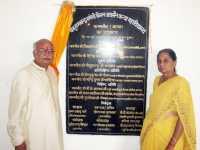 It has been over a week since 26 women from the rural areas of Uttar Pradesh embarked on a degree programme in a newly started college.
It has been over a week since 26 women from the rural areas of Uttar Pradesh embarked on a degree programme in a newly started college.
But for Piyush C Agrawal who donated half of the $500,000 that the college project cost, the struggle to start the community college looks like a minor odyssey.
"It was very tempting to think of giving up the project because of red tape and negative energy," says the 73-year educator and businessman in Arizona.
"But I had promised to complete the girls college project and eventually ensure over 100 girls would be educated every year."
The college is named after Agrawal's parents, and is situated in his birth town of Kagarol, 16 miles from Agra. The Babu Ramchandra Chameli Kiran Agrasen Kanya Mahavidyalaya is open for admission to the BA, BSc (Mathematics) and BSc (Biology) for the first year class.
"It required tremendous amount of patience and negotiations with the local authorities to continue with the project," said Agrawal, one of the most visible of Indian community leaders, who has also served as the leader of many associations including the Association of Indians in America. He has also served as president of several professional organizations such as the Florida Council of Teachers of Mathematics and the Florida Association of Mathematics Supervisors
From the very start more than three years ago, he wanted to get the villagers and local landlords and business people involved in the project.
"I thought if I put down all the money required to build the college, the villagers won't have any stake in the project," Agrawal, who has also worked as a school superitendent in New Jersey and Florida and served on many key educational boards, said.
"I wanted them to be committed to the project and be passionate about it. Though I discovered it was not easy to persuade them to donate land and other facilities to build a college for women, I was able to continue with the project because of the help I received from some of the NRIs who had returned to India. My own resolution and the help I received from my wife must have also influenced some villagers and their leaders."
He had been thinking of the importance of women's education for a long time, but had to wait till he was 65 to cut down some of his commitments to Indian organizations in America in order to free up time for the project.
"There is an old saying that an educated mother can do a better job of nurturing, cultivating proper values and sacraments among children than 10 fathers," he said.
"I have been inspired particularly by the efforts my mother made to inculcate values and principles not only in me but everyone else in the family and our relatives."
There is quite a bit of work to be done with the college, and he expects at least $200,000 to be raised for the extension.
"My wife Sudha and I are keen to empower the women so the social oppression can be minimized and their lifestyle can gain some independence," he says.
"The professors we have chosen are there not just because of their education but also for their commitment to make the degree programme much more than mere acquisition of knowledge."
Agrawal has also announced he will try to find ways to have two female senior class students spend at least one semester in USA as part of their education.
"I had been to the village many times in the past
four years to watch the progress of the college and iron out of the problems," Agrawal, who left India for America 42 years ago, said. "And yet I spoke to the villagers (at the inauguration of the college last month) in the local dialect.
"This was the first time I was addressing a large gathering (estimated at around 1,000). The people were more than delighted. It was like a new bond had been created.
"I think that I have paid the first installment of my indebtedness to my motherland," Agrawal said, "and I am humbled that I could do so with God's grace and the support of my wife Sudha, my children and other family members."





